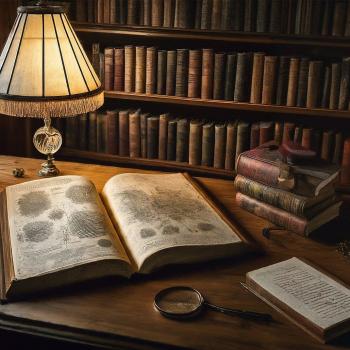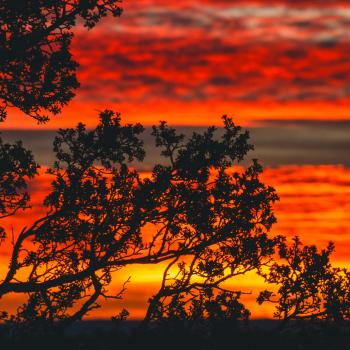By Sam Hamilton-Poore -- July 6, 2009
The heavens declare the glory of God;
the sky proclaims its builder's craft.
One day to the next conveys that message;
one night to the next imparts that knowledge.
There is no word or sound; no voice is heard;
Yet their report goes forth through all the earth,
their message, to the ends of the world.
Psalm 19:2-5a [NAB]
.jpg) We are blessed with two books through which God reveals God's own self: the Bible and creation. The first is a collection of stories, poetry, laws, and letters--a library of life experienced within the presence and movement of God. The second book is God's ancient-perhaps 15 billion years old--and yet ongoing work in--progress. Everyday, new stars and new children are born. Both books bear an imprint of divine inspiration, for both books have the same Author.
We are blessed with two books through which God reveals God's own self: the Bible and creation. The first is a collection of stories, poetry, laws, and letters--a library of life experienced within the presence and movement of God. The second book is God's ancient-perhaps 15 billion years old--and yet ongoing work in--progress. Everyday, new stars and new children are born. Both books bear an imprint of divine inspiration, for both books have the same Author.
The tradition of regarding scripture and creation as the "two books" of God's revelation is rooted in such passages as Psalm 19, in which the "heavens" actively declare God's glory and ingenuity from "day to day" and "one night to the next." The book of creation gives us a picture of God and the world that we may not see if we were to read only the Bible.
On the other hand, the Bible gives us a portrait of creation and God that we might not draw from nature alone. For example, while Psalm 65 catalogues all the natural marvels of sun and rain, land and sea, fruits and grains, it also repeatedly directs our gaze and our praise toward God as the Creator and Source of all these wonders. The psalm addresses God: "You visit the earth and water it...you greatly enrich it...you provide people with food...you crown the year with bounty..."
These two books--the book of creation and the book of scripture--are perhaps best read together, one in either hand. Both books bear witness to God's gift of life. The life we see on creation's pages is filled with beauty and terror, resilience and fragility, and possesses a rock-hard clarity that we can see, hear, touch, taste, and smell. The Bible also bears witness to this same life, while inviting us to enter a new relationship of life with God, our neighbors, and all creation--a life rooted in God's compassionate love and forgiveness.
One night this week, try "reading" these two books of God together by using the following prayer:
Meditation on Psalm 19
Directions:
►Go outside to a comfortable place where you may see the evening sky and listen to the sounds of the night.
►Read slowly through the words of Psalm 19 (above), perhaps even aloud. Notice any words or images for which you have a strong response, either positive or negative.
►Read through the psalm a second time, letting yourself receive an overall sense of what the passage is saying.
►Once you have spent time with the psalm, now "read" the "book of creation" around you--the evening sky, the sounds and smells of the night. Note what you see, hear, smell, and any other sensations you may feel with your body (e.g., shiver, sweat, breeze, etc.).
►Allow the "book of creation" to interpret the "book of scripture"; allow the "book of scripture" to interpret the "book of creation." What do they say to you about each other? [You may wish to take notes!]
Sam Hamilton-Poore is the Director of the Program in Christian Spirituality at San Francisco Theological Seminary, as well as Assistant Professor of Christian Spirituality. He is an ordained Minister of Word and Sacrament in the Presbyterian Church (U.S.A.) and has served congregations in North Carolina, Missouri, and Iowa.
1/1/2000 5:00:00 AM




